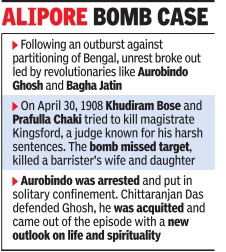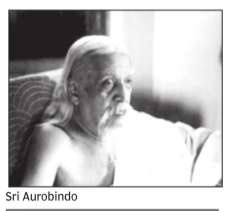Sri Aurobindo Ghosh

This is a collection of articles archived for the excellence of their content. |
A profile
Apr 25 2015
Bengal minister's Aurobindo play sitting on a time bomb
Priyanka Dasgupta
Did Rishi Aurobindo `run away' from the freedom movement? Or was he disillusioned by the ways of freedom fighters? This is one controversial question a Bengali play written and directed by state tourism minister and playwright Bratya Basu raises. The play, Boma -supposedly a work of fiction -is based on the Alipore bomb case and the year-long trial that followed. It takes off from April 30, 1908, when Khudiram Bose and Prafulla Chaki tried to kill magistrate Kingsford. The bomb missed the target and killed the wife and daughter of barrister Pringle Kennedy .
`Boma' -to be staged next Monday -heightens the visual experience using a simulated drizzle on stage. It also uses animation on a backdrop as lawyer Chittaranjan Das argues Aurobindo's defence saying: “I say that the man in his position isn't only standing before the bar of this court, but before the bar of the high court of history .“ Basu says he'd like to play Das's role in some shows.
Controversy begins after Judge Beachcroft announces the verdict.Aurobindo is among the 17 acquitted.Subtle hints are dropped at how the judge had a soft corner for Aurobindo since they were batchmates during civil services training. Bratya, who anchored path-breaking Bengali plays like `Ruddhasangeet' and `Winkle Twinkle', isn't scared of controversy .
He writes highly-loaded fictional dialogues for revolutionary Hemchandra Kanungo's character. Standing behind prison bars, Hemchandra bursts out in anger: “You (Aurobindo) have saved yourself but history won't forgive you.“ In another scene, Aurobindo's brother Barin says: “Why did I tell my brother survival lies only in mixing religion with politics? Little did I know he'd give up politics and take refuge in religion.“
Wasn't Basu scared to write such provocative lines? “These issues are frequently brought up in Aurobindo's context. In his lifetime Aurobindo never answered critics. I've tried to answer them and written dialogues for Aurobindo. I don't believe Aurobindo was an escapist. The play deals with the relationship between religion and politics -something haunting us today as well,“ he says.
Historian Rajat Kanta Ray says he has discussed Aurobindo's departure to Puducherry in his thesis. Asked if Aurobindo's `running away' from the freedom movement remains a topic of debate, Ray says: “I'd written that Aurobindo had taken off for Pondicherry to contemplate for the rest of his days `The Life Divine'. This was youthful writing and I've since rethought the matter. It's a fact that Aurobindo didn't engage in politics after his departure to Pondicherry .“
Ray says he's moved on and this subject doesn't interest him much.
Basu's fictional character, Kalpana, adds a twist to the narrative. In a fiery speech, she tears apart the image of holier-than-thou revolutionaries and talks about how infighting over trivial issues derailed the freedom struggle. In one scene, Basu refers to Barin alleging a relationship with a lady becoming an issue between revolutionaries Satyen Bose and Jatindranath Bandopadhyay . Ray says: “I came across files in the IB archives and the home political series where secret police alleged sexual intrigues.This is a matter for serious thinking.“ Peter Heehs, author of `The Bomb in Bengal' and `The Lives of Sri Aurobindo', says, “Even if I disagreed with him (Basu), I'd welcome an intelligent debate. As a historian who's researched Aurobindo's participation in the freedom movement, I'd be in a position to offer fact-based criticisms of the writer's interpretation.“ Having had his share of experiences in India for his books, does Heehs think Indian playwrights should focus on such sensitive issues? “If the issues are sensitive they should be examined with diligence and respect for the person under study,“ he says.
Debshankar Halder, who plays Aurobindo, says he consented to the role because it's important to have such dialogues. “People are free to reject them. But since the play resonates with emotional truth, Kolkata's audience will watch it.“
Matri Prasad, a Sri Aurobindo Ashram inmate in Puducherry , isn't closed to the idea of the play. “Everyone should be free to approach the truth in his own way . Why doubt the efforts of a playwright? I understand Bengali, but won't go the extra mile to watch it.“
Integral Yoga
The Times of India, Aug 14 2015
M N Kundu
All life is yoga“, said Sri Aurobindo, “ as life is the process of grand unification of the fragmented self with the comprehensive divine Self.As per the Holy Bible, in the beginning, the omnipotent Consciousness willed, “Let there be light, and there was light“.The said light is Agni of the Rig Veda and solar fire of modern science. Thus we find divine will in the form of life force and energy vibrations manifested in the form of light inherent at the root of the universe wherefrom sprang the trinity of the mind-mass-energy pluralism, all arising out of a singular Consciousness.Energy principle In the evolutionary process, energy or élan vital developed mind-principle, which is latent in matter, evident in plantlife, prominent in animals and better manifested in man. Mind, having some limited properties of consciousness, is the missing link between matter and consciousness. Evolutionary process is nothing but step-by-step realisation through progressive remembrance of consciousness, and now we have come to the level of homo sapiens in the process, which is also not the final outcome of evolution being enveloped in darkness of ignorance and disharmony. At this stage the highest outcome of creation is homo sapiens. Although far advanced in mental faculties it is subjected to severe limitations of human bondage in the bodymind complex. However, man is capable of having highest harmony, peace and potentiality by elevating his present mental state to a higher level which Sri Aurobindo called supramental or overmind. If the mind is perpetually tuned to the supramental state it can effect comprehensive transformation of our existence on earth.Scientific method To bring about the same Sri Aurobindo has worked out a systematic scientific method of spirituality which he called integral yoga. It calls for divinisation of inward and outward existence by simultaneous identification with our divine and universal self and acting accordingly as per dictates of that higher consciousness.
Any egoistic consideration or selfish desire obstructs identification with the Divine and hence is not compatible with Divine attunement. Surrendering to the will of the Almighty like a child in the hands of the Divine Mother facilitates showering of Divine grace.Thus purification of the lower nature and absolute surrender is the basis of progress while aspiration and wholehearted acceptance are the guiding forces.Collective transformation While traditional yoga aims at transformation of the ego into Divine Self, integral yoga aims further at bringing down that divine consciousness in external reality as well and thereby a total transformation. Tradi tional yoga is intended for ascent to Selfrealisation, or transformation of ego into divine self, a purely individual awakening while the integral yoga involves subsequent task of descent of that consciousness for collective transformation.It is not based on any external rituals but intense aspiration and sublimation of self. It is a collective task for the humanity at large but pioneered by Sri Aurobindo and Mother, his divine associate.
Sri Aurobindo turned to yoga for explorations into consciousness and discovered that man is a transitional being and elevation of consciousness will have the power to transform us from man human to man divine. He also delved the great passage to evolve as the new species beyond man with divine life through Integral Yoga. (August 15 is Sri Aurobindo's birth anniversary.)
Distortion of Vedanta
[ From the archives of the Times of India]
Ramesh Bijlani
Sri Aurobindo makes a powerful case for restoring the life-affirming and lifeenriching element of spirituality that had receded over the past 1,000 years. His Savitri and The Life Divine may be considered 20th century Upanishads written in English.
Vedanta postulates that the Creator did not create the material universe; it became the universe. The invisible aspect is referred to as the universal spirit. Reality, as constructed by the senses, is deceptive and hence an illusion because it excludes the invisible Absolute Reality. Illusory reality is just a phenomenon; it has a beginning and an end; and in between there is constant change. However,behind and beyond this illusion is the imperishable and constant Absolute Reality, the Brahmn. The one thing that matters is Brahmn, and to pursue that is the purpose of human life.
The other interpretation of Vedanta emphasises that matter is another form of the Absolute Reality. Sensual reality is only one part of the whole. Hence, the world is not an illusion but a manifestation of the Divine. If the Divine is Real, its manifestation cannot be unreal. The world may be a temporary reality, but while it lasts it is not unreal. Matter and spirit are two layers of the same Reality, matter being the superficial reality, and the spirit its deeper Reality. Because of the inherently divine nature of matter, even matter should be respected rather than rejected. Similarly, the world, and worldly life, also should not be rejected. Sri Aurobindo says it all in three lines in Savitri: “I looked upon the world and missed the Self,/ And when I found the Self, I lost the world,/ My other selves I lost and the body of God…”
Of these three lines, the first is the ‘denial of the materialist’; the second is the ‘refusal of the ascetic’; and the third is the flaw in the ‘refusal of the ascetic’ who, therefore, loses sight of the identity he has with the rest of the creation and also misses the joy of seeing “the body of God”. How we interpret Vedanta has important practical implications. Dismissing the visible universe as an illusion and considering the invisible Absolute Reality to be the sole reality has at least three corollaries. First, it makes spirituality the preserve of only a select few. Secondly, it makes worldly activity look like an exercise in futility. Hence, even those engaged in worldly activity do not put their heart and soul into it. Finally, it assigns a separate compartment to worldly life and spiritual life. My independent existence with my individual desires and ambitions is the sole reality of worldly life. On the other hand, seeing the Divine in all creation implies respect for all creation, including a material object. It also implies that at the deepest level we are all interrelated and interdependent. This vision translates into love and compassion for my fellow beings. Sri Aurobindo made a powerful and rational case for the life-affirming view of spirituality. There is reason to believe that in the next step in evolution, mind will give way to supermind. While the evolution of the supermind is certain, human beings are in the unique position of collaborating with nature, and thereby accelerating the process of evolution.
If the number of individuals consciously living a life conducive to growth of consciousness reaches a critical mass, it will lead to a rise in the level of earth consciousness.
